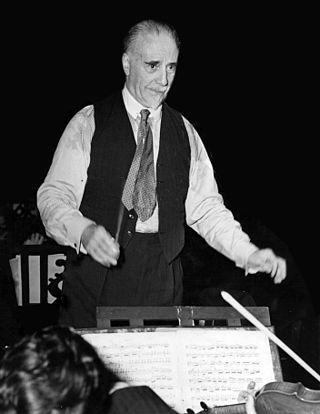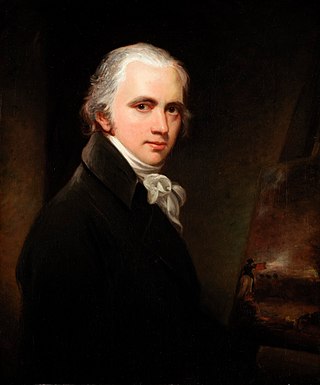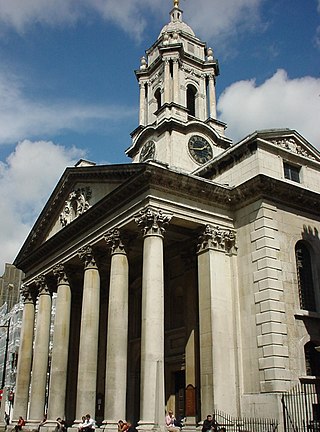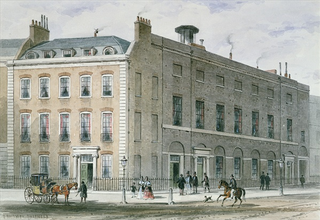Kapellmeister, from German Kapelle (chapel) and Meister (master), literally "master of the chapel choir", designates the leader of an ensemble of musicians. Originally used to refer to somebody in charge of music in a chapel, the term has evolved considerably in its meaning and is today used for denoting the leader of a musical ensemble, often smaller ones used for TV, radio, and theatres.

Sir Thomas Beecham, 2nd Baronet, was an English conductor and impresario best known for his association with the London Philharmonic and the Royal Philharmonic orchestras. He was also closely associated with the Liverpool Philharmonic and Hallé orchestras. From the early 20th century until his death, Beecham was a major influence on the musical life of Britain and, according to the BBC, was Britain's first international conductor.

Royal Liverpool Philharmonic is a music organisation based in Liverpool, England, that manages a professional symphony orchestra, a concert venue, and extensive programmes of learning through music. Its orchestra, the Royal Liverpool Philharmonic Orchestra, is the UK's oldest continuing professional symphony orchestra. In addition to the orchestra, the organisation administers the Royal Liverpool Philharmonic Choir, the Liverpool Philharmonic Youth Company and other choirs and ensembles. It is involved in educational and community projects in Liverpool and its surrounding region. It is based in the Liverpool Philharmonic Hall, an Art Deco concert hall built in the late 1930s.

The Royal Philharmonic Orchestra (RPO) is a British symphony orchestra based in London.

Sir William Beechey was a British portraitist during the golden age of British painting.

The Royal Philharmonic Society (RPS) is a British music society, formed in 1813. Its original purpose was to promote performances of instrumental music in London. Many composers and performers have taken part in its concerts. It is now a membership society, and while it no longer has its own orchestra, it continues a wide-ranging programme of activities which focus on composers and young musicians and aim to engage audiences so that future generations will enjoy a rich and vibrant musical life. Since 1989, the RPS has promoted the annual Royal Philharmonic Society Music Awards for live music-making in the United Kingdom.

Classical music of the United Kingdom is taken in this article to mean classical music in the sense elsewhere defined, of formally composed and written music of chamber, concert and church type as distinct from popular, traditional, or folk music. The term in this sense emerged in the early 19th century, not long after the United Kingdom of Great Britain and Ireland came into existence in 1801. Composed music in these islands can be traced in musical notation back to the 13th century, with earlier origins. It has never existed in isolation from European music, but has often developed in distinctively insular ways within an international framework. Inheriting the European classical forms of the 18th century, patronage and the academy and university establishment of musical performance and training in the United Kingdom during the 19th century saw a great expansion. Similar developments occurred in the other expanding states of Europe and their empires. Within this international growth the traditions of composition and performance centred in the United Kingdom, including the various cultural strands drawn from its different provinces, have continued to evolve in distinctive ways through the work of many famous composers.

St George's, Hanover Square, is an Anglican church, the parish church of Mayfair in the City of Westminster, central London, built in the early eighteenth century as part of a project to build fifty new churches around London. The church was designed by John James; its site was donated by General William Steuart, who laid the first stone in 1721. The building is one small block south of Hanover Square, near Oxford Circus. Because of its location, it has frequently been the venue for society weddings.
Promenade concerts were musical performances in the 18th and 19th century pleasure gardens of London, where the audience would stroll about while listening to the music. The term derives from the French se promener, "to walk".

Esther is an oratorio by George Frideric Handel. It is generally acknowledged to be the first English oratorio. Handel set a libretto after the Old Testament drama by Jean Racine. The work was originally composed in 1718, but was heavily revised into a full oratorio in 1732.

The Handel festival or "Commemoration" took place in Westminster Abbey between 26 May and 5 June 1784, to commemorate the twenty-fifth anniversary of the death of George Frideric Handel in 1759.

Henry Wylde was an English conductor, composer, teacher and music critic.
John Crosdill (1751–1825) was an English musician, cellist and violist.
The Avison Ensemble is one of England's leading exponents of classical music on period instruments. It is named after Charles Avison (1709–1770), the Newcastle-born composer, conductor and organist, considered ‘the most important English concerto composer of the 18th Century’. Comprising some of Europe's leading musicians and soloists, the Ensemble is directed by violinist Pavlo Beznosiuk. It varies in numbers depending on the repertoire being performed, and is typically of chamber ensemble or concerto grosso size, expanding to full chamber orchestra when needed.

Baroque music of the British Isles bridged the gap between the early music of the Medieval and Renaissance periods and the development of fully fledged and formalised orchestral classical music in the second half of the eighteenth century. It was characterised by more elaborate musical ornamentation, changes in musical notation, new instrumental playing techniques and the rise of new genres such as opera. Although the term Baroque is conventionally used for European music from about 1600, its full effects were not felt in Britain until after 1660, delayed by native trends and developments in music, religious and cultural differences from many European countries and the disruption to court music caused by the Wars of the Three Kingdoms and Interregnum. Under the restored Stuart monarchy the court became once again a centre of musical patronage, but royal interest in music tended to be less significant as the seventeenth century progressed, to be revived again under the House of Hanover. The Baroque era in British music can be seen as one of an interaction of national and international trends, sometimes absorbing continental fashions and practices and sometimes attempting, as in the creation of ballad opera, to produce an indigenous tradition. However, arguably the most significant British composer of the era, George Frideric Handel, was a naturalised German, who helped integrate British and continental music and define the future of music in the United Kingdom.

Charles James Kennedy Osborne Scott was an English organist and choral conductor who played an important part in developing the performance of choral and polyphonic music in England, especially of early and modern English music.

The Hanover Square Rooms or the Queen's Concert Rooms were assembly rooms established, principally for musical performances, on the corner of Hanover Square, London, England, by Sir John Gallini in partnership with Johann Christian Bach and Carl Friedrich Abel in 1774. For exactly one century this was the principal concert venue in London. The premises were demolished in 1900.
Joah Bates was an English musician.

The Water Music is a collection of orchestral movements, often published as three suites, composed by George Frideric Handel. It premiered on 17 July 1717, in response to King George I's request for a concert on the River Thames.

Samuel Harrison was an English singer. A tenor, he sang in notable concerts of the day, including the Concerts of Antient Music and the Three Choirs Festival.















